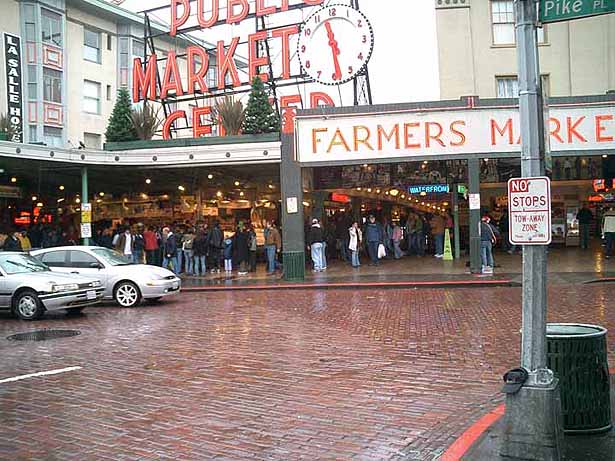The photograph is stunning. There is bread, chicken and beef, bacon, fresh fruits and vegetables, eggs, milk, olive oil and much more. If you haven't seen the graphic, and haven't read the article it accompanied, go on-line to the May 18th New York Times Magazine story on the amount of food we waste in America. The photograph represents the food a family of four throws out each month, an astounding 122 pounds. People around the world are starving. Food banks in America report that donations of food are down, yet the number of people showing up for food has increased. Yet, according to the Times article, reported by Andrew Martin, a study on food waste (from 1997) found that 27 percent of the food available for consumption - or 96.4 billion pounds of food - ends up in landfills. In some cities, including New York, 'food rescue organizations' work to get donated food from cafeterias and restaurants and to people who are hungry - not table scraps, but food that was never served.
What can we do to cut down on food waste? I'll admit, there is a banana sitting on my drainboard right now that I would rather toss than eat mushy, and I can't bake tonight. How can we waste less food?
A journey into the world of "real food" with Seattle-based journalist Rebecca Morris

Tuesday, May 20, 2008
Subscribe to:
Post Comments (Atom)
5 comments:
I think produce is one of the easiest things to waste because it goes bad so quickly. Now, I try to buy my produce a couple of days in advance max. That way, it's always fresh and I'm throwing out a lot less. If you're still throwing out gobs of veggies, consider buying frozen. They contain all the health benefits of fresh and last a whole lot longer. I've also heard of Ethos tabs (available at Whole Foods) or green bags that you can put your produce in that help it keep longer, but I have yet to try them.
If you regularly don't finish your meal when you go out to eat, consider ordering off the children's menu. Many restaurants don't mind and you'll save food and save money!
Many restaurants also serve large portions. My husband and I have been sharing meals for a few years now. Sometimes there is a charge for it, but usually not. It works for us though - no temptation to eat too much and no throwing out doggie bag contents that sit in the fridge too long.
I usually shop for produce every day. There are 5 grocery stores within 1 mile of my apartment, so no matter which way I go, I can pop in for a few minutes. I try to plan the next day's meal based on what produce I have in the kitchen already and usually only throw the parts (steps, a few bad leaves, apple cores, banana peels) that we can't eat into the yard waste bin each week. Occasionally I'll find something that I missed and have to throw it out.
I love buying on an almost daily basis. I only need to bring home what is required for a day or two and it hardly goes to waste. I also have a good grasp of what is available to cook, so even if I am at school, I can make a mental list and stop on my way home for supplies.
How can we waste less? The number one way to waste less would be to buy only what we know we'll eat. I don't always do that, so I've come up with some ways to deal with the excess.
Preserve the extra and add it to later meals. Mash up your banana and put it in the freezer, then add it to pancake batter or make banana bread later. (You can scale down a recipe if you're concerned you'll overeat "bad" foods.)
I dry leafy greens such as lettuce, cilantro, and parsley that might otherwise go to waste by laying them on a cookie sheet and putting them in the oven after I'm done baking something. (They dry quickly, and with the oven already off, it doesn't use more energy.) They can be tossed in a soup or some other dish later.
I make syrup from extra fruit juice. Whether it's that extra little bit in the pitcher that no one seems to want to finish off, juice that drains from (washed) cut fruit, or the juice or syrup from canned fruit, I pour it all into a container that I keep in the freezer. When the container's full, I boil the juices down to a thicker syrup. I've had some interesting, but always delicious, flavor combinations, tarter (and I'm guessing lower calorie) than syrups sold in stores.
Extra meat is added to pilafs or soups, usually after a short stay in the freezer.
There are many things to do with excess food. The actions are easy; the hard part is cultivating your awareness of it.
Our solution has been to keep our fridge a little more on the empty side and shop more often. This way you are not doing as much inventory management. It's easier to waste food if you can't see what's in your fridge and your pantry. Sure, it takes time to stop at the store during the week but that way your produce is fresh anyway. Sure, we still waste the occasional banana, but more often than not we run out of food and have to go to the store. The other part of the solution for us is being more disciplined about eating what we have available before we buy something new. When we were eating a lot of takeout and prepared foods, it was more tempting to skip the contents of the fridge and get something more interesting. But now that we're eating mostly fruits and veggies, we tend to eat what we have available.
Post a Comment